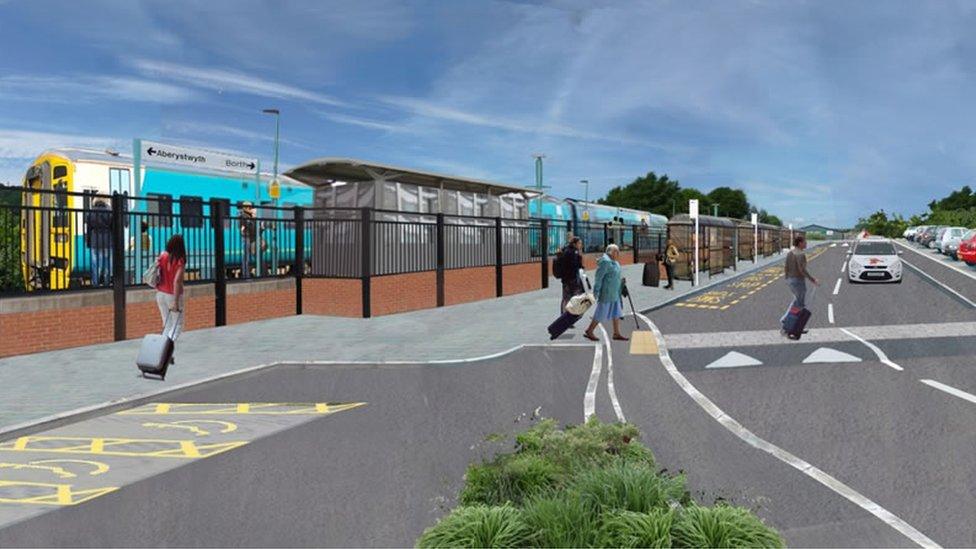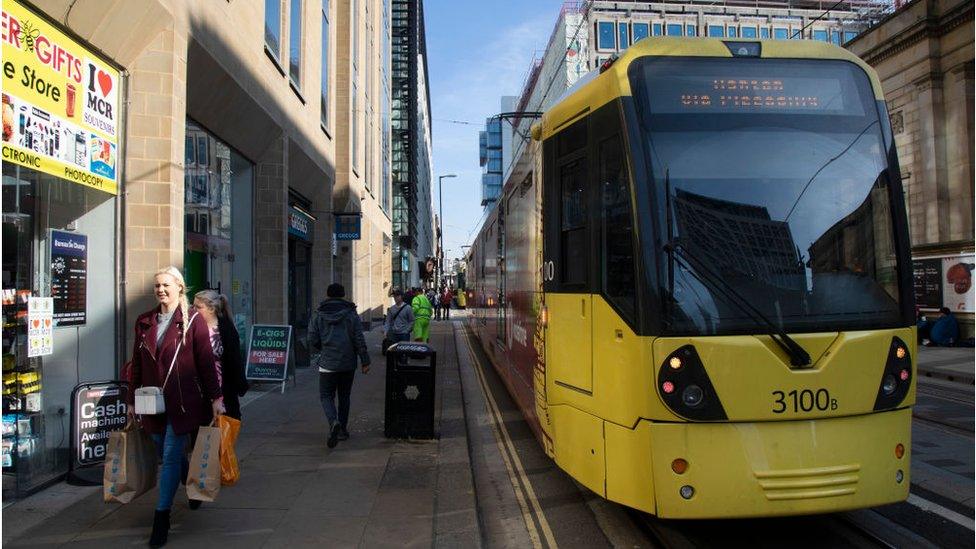Beeching rail cuts: Fund to help restore lines goes ahead amid criticism
- Published

Transport Secretary Grant Shapps meets people at the launch at Fleetwood
Transport Secretary Grant Shapps has launched a government fund to help restore historic railway lines closed in the 1960s after the Beeching report.
The £500m fund will not be used to build new railway lines - it is only meant to fund feasibility studies of routes that could be restored.
The plan was promised in November's Conservative election manifesto.
But Labour called the initiative "meaningless", adding that £500m would help reopen just 25 miles of railway.
And the Rail, Maritime and Transport union (RMT) described the funds as a "drop in the ocean".
The government will start by funding proposals for two lines - the Ashington-Blyth-Tyne line in Northumberland and the Fleetwood line in Lancashire.
Communities will also be able to apply for some of the remainder of the £500m pot to help restore their lines.
What were the Beeching cuts?
Roughly 5,000 miles of track were closed and more than 2,300 stations were axed in the 1960s, mainly in rural areas, following the Beeching report.
The aim was to cut the mounting debts of the nationalised British Rail by removing duplicated routes and closing the least-used branch lines of the railway. This became known as the Beeching cuts.
The plans drew huge opposition from rural local communities, which campaigned and successfully prevented some routes and stations from closing.
What is the government planning to do?
On Tuesday, Mr Shapps visited the Fleetwood and Poulton-le-Fylde line which was closed in 1970.
"Many communities still live with the scars that came from the closure of their local railway more than five decades ago," he said.
"Investing in transport links is essential to levelling up access to opportunities across the country, ensuring our regions are better connected, local economies flourish and more than half a century of isolation is undone."


People in Fleetwood, a town of 25,000 that is hemmed in on the Lancashire coast, told us unanimously that reopening their defunct rail line to nearby Poulton-le-Fylde would be a good thing.
They say their town has lost so much over the years and they hope that restoring the railway would help regenerate the area and cut congestion on the roads.
The government is currently falling over itself to back policies that improve regional connectivity around the country. Just think of its bailout for the regional airline Flybe.
But today's announcement is only a tentative step towards recreating a functioning railway to Fleetwood. An assessment of the economic and social case will now be carried out. The funding for Fleetwood - £100,000 - is peanuts for now.
If the assessment is positive, more money will follow.
However, even £500m (the total funding pledged for helping to reopen lines cut during the Beeching era) is not a big sum of money in railway infrastructure terms.
Michael Byng, a railway construction consultant, believes reopening the Colne to Skipton line near Leeds would cost around £368m on its own.
He also believes that reopening the rail line to Fleetwood, which does have a tram that runs along the coast to Blackpool, would not be money well spent and other options like improving the connectivity of the tram itself should be considered.

What reaction has there been?
Commenting on the proposals, shadow transport secretary Andy McDonald said: "The Conservatives claim to have been reversing Beeching cuts since 2017 despite not reopening an inch of track.
"Investing in the railway is a fantastic policy but this is meaningless without a serious funding commitment of billions of pounds."
Volunteer train driver Chris Cubitt and North Yorkshire Moors Railway general manager Philip Benham on 50 years since Beeching Axe rail report
Mick Cash, general secretary of the RMT union, was similarly sceptical about the government's plans.
"RMT welcomes any investment in our railways but £500m is a drop in the ocean compared to what's really required to connect our abandoned communities and reverse decades of cuts to infrastructure and maintenance," he said.
Dennis Fancett, chairman of South East Northumberland Rail User Group, told the BBC: "What I was really hoping for was an announcement that we're all systems go and funding for the entire reopening is provided and building can start.
"The business case for reopening this line is the economic regeneration of South East Northumberland."
Brian Crawford, chairman of the Poulton & Wyre Railway Society, said restoration of the disused railway line to Fleetwood from Poulton-le-Fylde could reinvigorate the coastal town.
"There are two aims - one of commuters going to work and the other one is to make Fleetwood a major tourist destination. It has a fantastic seafront but without a railway, we don't seem to get that many visitors," he told the BBC.


Do you have a question about the government's rail plans?
In some cases your question will be published, displaying your name, age and location as you provide it, unless you state otherwise. Your contact details will never be published. Please ensure you have read our terms & conditions and privacy policy.
Use this form to ask your question:
If you are reading this page and can't see the form you will need to visit the mobile version of the BBC website to submit your question or send them via email to YourQuestions@bbc.co.uk, external. Please include your name, age and location with any question you send in.
- Published13 January 2020

- Published4 December 2019
